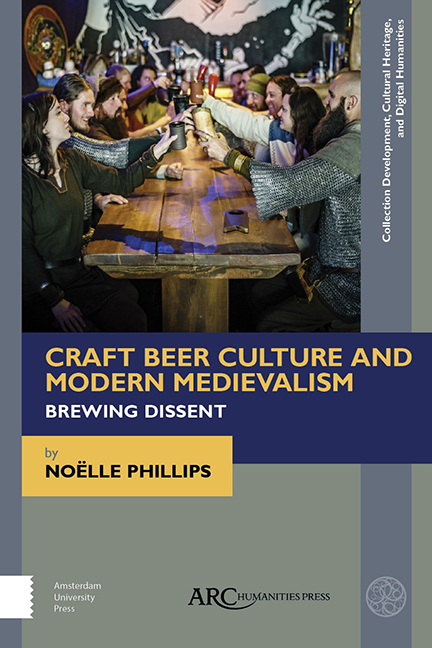Book contents
- Frontmatter
- Contents
- List of Illustrations
- Acknowledgements
- Chapter 1 Introduction: Medievalism and Craft Beer
- Chapter 2 Reading Beer in the Middle Ages
- Chapter 3 Resistance and Revolution: Craft Beer Versus Corporate Giants
- Chapter 4 Beer Heroes and Monastic Medievalism
- Chapter 5 Militant Medievalism: Norsemen, Mythology, and Masculinity
- Chapter 6 Pale Ales and White Knights: Craft Brewing, Whiteness, and Medievalism
- Chapter 7 Conclusion: The Alchemy of Alcohol
- Select Bibliography
- Index
Chapter 4 - Beer Heroes and Monastic Medievalism
Published online by Cambridge University Press: 20 November 2020
- Frontmatter
- Contents
- List of Illustrations
- Acknowledgements
- Chapter 1 Introduction: Medievalism and Craft Beer
- Chapter 2 Reading Beer in the Middle Ages
- Chapter 3 Resistance and Revolution: Craft Beer Versus Corporate Giants
- Chapter 4 Beer Heroes and Monastic Medievalism
- Chapter 5 Militant Medievalism: Norsemen, Mythology, and Masculinity
- Chapter 6 Pale Ales and White Knights: Craft Brewing, Whiteness, and Medievalism
- Chapter 7 Conclusion: The Alchemy of Alcohol
- Select Bibliography
- Index
Summary
Newton Haven was our hometown. Our cradle, our playground, our universe and that night it was the site of an heroic quest. The aim? To conquer the Golden Mile. Twelve pubs along a legendary path of alcoholic indulgence, terminating at the alehouse that would herald our success: the World's End.
Neomedievalism sees the possibility of the Middle Ages as a cycle, an ahistorical historical state to which it is possible to return.
IN THE 2013 film The World's End, directed by Edgar Wright and written by Wright and Simon Pegg, the main character, Gary (played by Pegg), a middle-aged man who has made nothing of his life, gathers his old school friends together to return to their hometown of Newton Haven, England, and complete a famed pub crawl— the Golden Mile— that they had attempted and failed when they were eighteen. The epigraph that opens this chapter is Gary's internal recollection of that time. To Gary, the completion of the Golden Mile, which includes a beer at every pub, is not only a return to the powerful, heady days of his youth, but a confirmation that he has truly passed into manhood. The film implies that in Gary's mind, the Golden Mile is a coming-of-age experience that can transform him into the masculine, powerful, confident man he wishes to be. It is a hero's journey predicated on a return to beginnings, but which leads to endings, both symbolic and literal; the World's End pub at the completion of the Golden Mile becomes the site of an encounter with alien colonizers who bring on the apocalypse.
I introduce this dark comedy because it provides an example of how beer stories and medievalism can intersect in unusual ways. The film memorably and humorously illustrates not only the gendering of beer consumption as masculine, which was discussed in the previous chapter and is further addressed in the following pages, but also the easy conflation of a beer journey with the narrative tradition of heroic transformation— a transformation that requires the hero first to return to and understand his origins (his “cradle” and “playground”), and then to move forward into the future.
- Type
- Chapter
- Information
- Craft Beer Culture and Modern MedievalismBrewing Dissent, pp. 67 - 96Publisher: Amsterdam University PressPrint publication year: 2019



